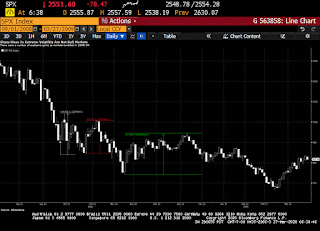Another day, another 3% + move in the markets. This is starting to feel normal. After falling into a bear market faster than any time in history, the market just posted one of its strongest weekly rebounds ever. The questions I began receiving yesterday afternoon can be summarized in one short line "is the Bear Market over?" In my view the answer is "not yet." History, fundamentals, and that very dangerous emotion known as "feelings" are on my side.
The history of bear markets suggest that a quick resolution of the bear is extremely rare, if ever. Bear market rallies can be powerful, as we saw this week. In my view, the goal of the bear market is to break the spirit of investors, both long and short. These powerful rallies tend to squeeze out the short sellers, providing fuel to the upward move, then breaks their hearts as it returns to the downtrend. We only need to look at 2008 for an example of this action. The fuzzy chart below shows three robust rallies of 24%, 19%, and 27% in October, November, and from Thanksgiving to Christmas of 2008. The market ultimately bottomed three months later, which felt like an eternity.
While markets tend to trade ahead of changes in the fundamentals, we are just at the beginning of the slowdown. We have virtually zero idea what the impact on earnings will be from these quarantines, so any earnings estimate is nothing more than a guess. Yesterday we saw the first snippet of bad news as the unemployment report jumped by 3 million, a record. Given 12 million people work in the food services industry and 17 million in the hospitality services industry, I expect those unemployment numbers continue to spike. It does appear the fiscal stimulus package could pass as early as today, but the question then becomes "how long will it take to get into consumer hands" and "what type of impact will it have." The answer to the first question is "never soon enough," while the answer to the second question is "it depends." What does it depend upon? The length and infection rate of this virus and how long the shut-in-place response lasts.
The last reason I doubt the bear is over is my "feeling," which is ironic given that just yesterday, in an interview with Reuters, I gave this quote: "The most dangerous three phrases in our business are 'this time is different' 'I feel as though…' and 'I hope' . It's never different, your feelings are wrong, and hope isn't an investment strategy." The consensus seems to be we haven't yet seen the bottom, which makes me immediately concerned as I try to avoid being in the consensus, however, this time I FEEL as though the consensus may be correct, although I HOPE they are not.
I have been through a number of bear markets and will posit that we will do some things right, and will definitely do some things wrong during this period. It's part of the business at all times, unfortunately the errors get magnified during a bear market. Everyone is smart in a bull market, everyone is dumb in a bear market. The most important part of navigating a bear market is not to dwell on the mistakes-NO ONE navigates through this perfectly. Perfection is the enemy of success in a bear market. Regret minimization is the key to mental stability and successfully coming out of a bear market. Don't dwell on the mistakes, it will keep you from executing your plan.
This too shall end.
Have a great weekend
Ned




